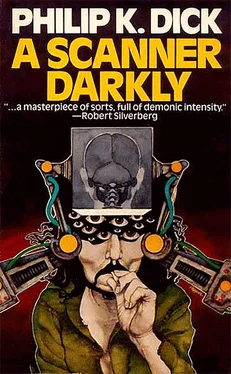“Too late for the brake,” Jerry panted, trying to get his ugly greasy hair from his eyes and blinking. “No time.”
“ ‘S he okay?” Charles Freck yelled. His heart still pounded.
“Yeah.” Jerry stood by the boy, gasping. “Shit!” he yelled at the boy in fury. “Didn’t I tell you to wait until we were doing it with you? And when a bumper jack slips—shit, man, you can’t hold back five thousand pounds!” His face writhed. The boy, little Ratass, looked miserable and twitched guiltily. “I repeatedly and repeatedly told you!”
“I went for the brake,” Charles Freck explained, knowing his idiocy, his own equal fuckup, great as the boy’s and equally lethal. His failure as a full-grown man to respond right. But he wanted to justify it anyhow, as the boy did, in words. “But now I realize—” he yammered on, and then the fantasy number broke off; it was a documentary rerun, actually, because he remembered the day when this had happened, back when they were all living together. Jerry’s good instinct—otherwise Ratass would have been under the back of the Pontiac, his spine smashed.
The three of them plodded gloomily back toward the house, not even chasing the tire and wheel, which was still rolling off.
“I was asleep,” Jerry muttered as they entered the dark interior of the house. “It’s the first time in a couple weeks the bugs let up enough so I could. I haven’t got any sleep at all for five days—I been runnin’ and runnin’. I thought they were maybe gone; they’ve been gone. I thought they finally gave up and went somewhere else, like next door and out of the house entirely. Now I can feel them again. That tenth No Pest Strip I got, or maybe it’s the eleventh—they cheated me again, like they did with all the others.” But his voice was subdued now, not angry, just low and perplexed. He put his hand on Ratass’s head and gave him a sharp smack. “You dumb kid—when a bumper jack slips get the hell out of there. Forget the car. Don’t ever get behind it and try to push back against all that mass and block it with your body.”
“But, Jerry, I was afraid the axle—”
“Fuck the axle. Fuck the car. It’s your life.” They passed on through the dark living room, the three of them, and the rerun of a now gone moment winked out and died forever.
“Gentlemen of the Anaheim Lions Club,” the man at the microphone said, “we have a wonderful opportunity this afternoon, for, you see, the County of Orange has provided us with the chance to hear from—and then put questions to and of—an undercover narcotics agent from the Orange County Sheriff’s Department.” He beamed, this man wearing his pink waffle-fiber suit and wide plastic yellow tie and blue shirt and fake leather shoes; he was an overweight man, overaged as well, overhappy even when there was little or nothing to be happy about.
Watching him, the undercover narcotics agent felt nausea.
“Now, you will notice,” the Lions Club host said, “that you can barely see this individual, who is seated directly to my right, because he is wearing what is called a scramble suit, which is the exact same suit he wears—and in fact must wear—during certain parts, in fact most, of his daily activities of law enforcement. Later he will explain why.”
The audience, which mirrored the qualities of the host in every possible way, regarded the individual in his scramble suit.
“This man,” the host declared, “whom we will call Fred, because this is the code name under which he reports the information he gathers, once within the scramble suit, cannot be identified by voice, or by even technological voiceprint, or by appearance. He looks, does he not, like a vague blur and nothing more? Am I right?” He let loose a great smile. His audience, appreciating that this was indeed funny, did a little smiling on their own.
The scramble suit was an invention of the Bell Laboratories, conjured up by accident by an employee named S. A. Powers. He had, a few years ago, been experimenting with disinhibiting substances affecting neural tissue, and one night, having administered to himself an IV injection considered safe and mildly euphoric, had experienced a disastrous drop in the GABA fluid of his brain. Subjectively, he had then witnessed lurid phosphene activity projected on the far wall of his bedroom, a frantically progressing montage of what, at the time, he imagined to be modern-day abstract paintings.
For about six hours, entranced, S. A. Powers had watched thousands of Picasso paintings replace one another at flashcut speed, and then he had been treated to Paul Klees, more than the painter had painted during his entire lifetime. S. A. Powers, now viewing Modigliani paintings replace themselves at furious velocity, had conjectured (one needs a theory for everything) that the Rosicrucians were telepathically beaming pictures at him, probably boosted by microrelay systems of an advanced order; but then, when Kandinsky paintings began to harass him, he recalled that the main art museum at Leningrad specialized in just such nonobjective moderns, and decided that the Soviets were attempting telepathically to contact him.
In the morning he remembered that a drastic drop in the GABA fluid of the brain normally produced such phosphene activity; nobody was trying telepathically, with or without microwave boosting, to contact him. But it did give him the idea for the scramble suit. Basically, his design consisted of a multifaced quartz lens hooked to a miniaturized computer whose memory banks held up to a million and a half physiognomic fraction-representations of various people: men and women, children, with every variant encoded and then projected outward in all directions equally onto a superthin shroudlike membrane large enough to fit around an average human.
As the computer looped through its banks, it projected every conceivable eye color, hair color, shape and type of nose, formation of teeth, configuration of facial bone structure—the entire shroudlike membrane took on whatever physical characteristics were projected at any nanosecond, and then switched to the next. Just to make his scramble suit more effective, S. A. Powers programmed the computer to randomize the sequence of characteristics within each set. And to bring the cost down (the federal people always liked that), he found the source for the material of the membrane in a by-product of a large industrial firm already doing business with Washington.
In any case, the wearer of a scramble suit was Everyman and in every combination (up to combinations of a million and a half sub-bits) during the course of each hour. Hence, any description of him—or her—was meaningless. Needless to say, S. A. Powers had fed his own personal physiognomic characteristics into the computer units, so that, buried in the frantic permutation of qualities, his own surfaced and combined … on an average, he had calculated, of once each fifty years per suit, served up and reassembled, given enough time per suit. It was his closest claim to immortality.
“Let’s hear it for the vague blur!” the host said loudly, and there was mass clapping.
In his scramble suit, Fred, who was also Robert Arctor, groaned and thought: This is terrible.
Once a month an undercover narcotics agent of the county was assigned at random to speak before bubblehead gatherings such as this. Today was his turn. Looking at his audience, he realized how much he detested straights. They thought this was all great. They were smiling. They were being entertained.
Maybe at this moment the virtually countless components of his scramble suit had served up S. A. Powers.
“But to be serious for just a moment,” the host said, “this man here …” He paused, trying to remember.
Читать дальше








